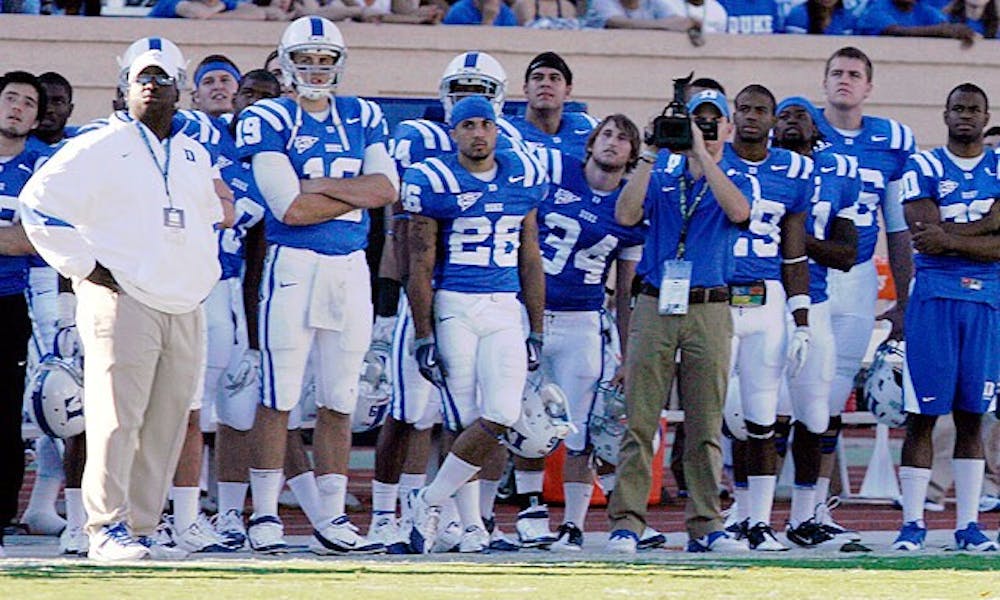When I went to Wallace Wade Stadium last Saturday, I didn’t go to listen to Top 40 music blare through the stadium P.A. system in a pathetic attempt to keep me amped up for football while the guys in black and white stripes stood with their hands on their hips staring up at the press box.
Yes, I understand, they were just doing their jobs as the NCAA rules instruct them to, waiting on one of their colleagues in the press box to review the outcome of the previous play. As a spectator, I was frustrated by the extended delay, one of several that took place during Saturday’s game. I don’t stand alone in my opinion, however, that college football needs to scrap the instant replay system that it currently uses.
In fact, one of the people who agrees with me is a man whose seven-figure salary depends in part on the calls of those officials. Though it might be construed as a disappointing sign of the lack of progress on the field in recent weeks, the last quarter of head coach David Cutcliffe’s weekly press conference Tuesday evolved into a discussion of instant replay and why the current system is inadequate.
“I’ve become less of a fan of replay,” Cutcliffe said. “The stoppage is annoying and ruins the momentum of the game. Football doesn’t happen in slow motion. I hear too many analysts get too analytical—slowing everything down and telling a guy what he should have done. It doesn’t work that way.”
Under the current framework, a replay assistant is tucked away in the press box of every stadium in front of a monitor, where he thoroughly reviews every play. He’s looking for several things.
First, he looks for reasonable evidence to believe an error was made in the initial on-field ruling. If there is, and the play is both reviewable and has a direct impact on the game, he pages the lead official to stop play for a second look.
While in theory it makes sense to do everything possible to get the call right, the pendulum has swung too far. Replay has created a crutch for officials, and now there is an expectation that every fumble, trapped pass or tightrope walk of the sideline will be reviewed.
This is a major issue because there are varying numbers of cameras at each game, depending on the level of television coverage. For instance, for the Duke-Richmond matchup, the replay official will have far fewer replay angles at his disposal than he would at a higher-profile matchup like Duke-North Carolina. In a game with diminished replay coverage, it shouldn’t be in the back of a referee’s mind that he has replay to bail him out, as the inferior footage may not produce indisputable evidence.
A perfect example of replay exerting its unwelcome and overbearing presence occurred when Duke wide receiver Jamison Crowder coughed the ball up on a return Saturday. He recovered his own fumble, making it irrelevant whether or not he had fumbled in the first place.
Still, the officials spent several painful minutes reviewing the play, interrupting the fluidity of the game and taking away from the spectators’ enjoyment and the players’ focus. As it is, the average college football game takes close to three and a half hours, which is already long enough.
“Let’s just play the game,” Cutcliffe said. “After the return, I would like to have the momentum to just go out and play rather than waiting around for something I knew wasn’t going to be overturned.”
Instant replay became a part of the college game after Michigan State’s upset of previously unbeaten Michigan in 2001. In that game, there was a controversial ending in which the timekeeper appeared to stop the clock early after a Spartan spike. The extra second of regulation allowed for a final play which resulted in the decisive touchdown.
Don’t get me wrong—NCAA football does need replay. They should, however, adopt the same policy that the NFL uses. Instead of having a booth official automatically review every play, coaches should have two challenges that they can strategically use at any point in the game.
This would make it risky to question a less significant play early in the game, since the coach would lose the opportunity to challenge a potentially game-changing play later. Any rule change that would add more strategy to the game enhances viewing pleasure for fans. The integrity of the game’s ultimate outcome would be ensured by automatic replay during the last two minutes of each half and overtime.
College coaches do have the ability to challenge once per game—provided that they have a timeout, which will be taken away if the challenge fails—but Cutcliffe emphasized that such a challenge is effectively pointless because the replay official is already reviewing every play.
Cutcliffe’s issues with the replay rules do not have any bearing on his feelings about officials. He emphatically pointed out that the officials are very good and get the vast majority of calls right at live speed.
“I love our officials,” Cutcliffe said. “They’re great communicators. They are very efficient. I would rather them do their job than all of us have to worry about what’s going on with replay.”
If I had my way, we’d get the best of both worlds. The flow of the game would be preserved, and human error would not be the difference between the win and loss column.
Get The Chronicle straight to your inbox
Signup for our weekly newsletter. Cancel at any time.

